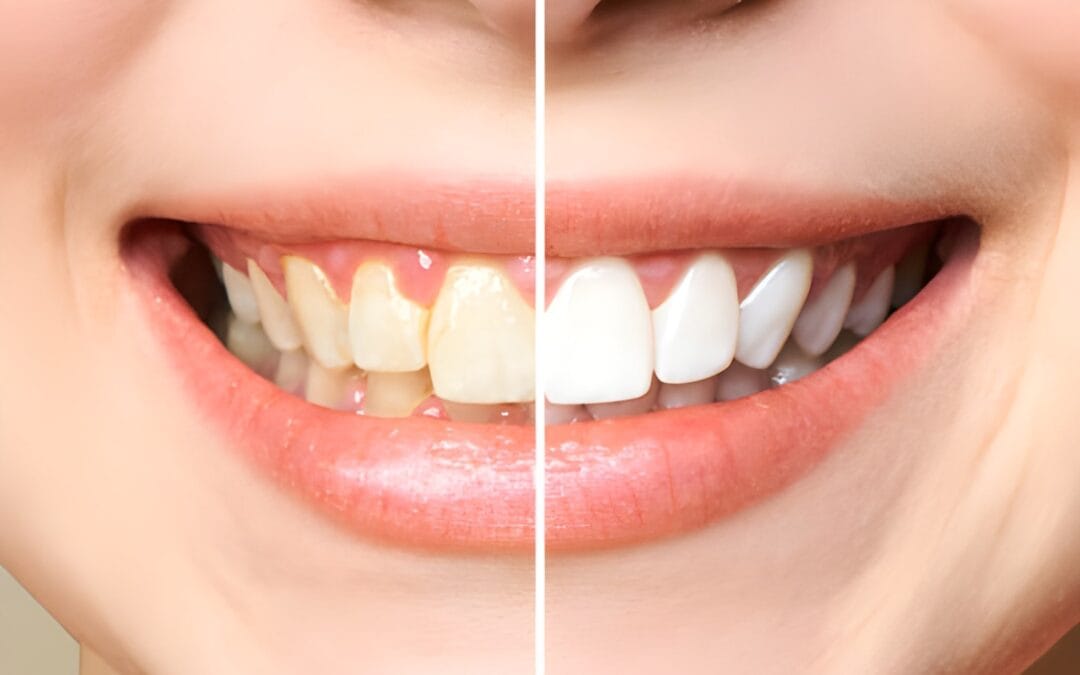Teeth whitening is an effective and popular way to enhance your smile by removing stains and discolouration. However, some people experience temporary sensitivity following treatment, which is a common and manageable side effect.
How Does Teeth Whitening Work?
Most whitening treatments use a peroxide-based bleaching agent that penetrates the enamel to break down discoloured molecules. While highly effective, this process can sometimes affect the tooth nerves, leading to short-term sensitivity.
What Causes Sensitivity After Teeth Whitening?
Tooth sensitivity occurs when the whitening agent passes through the enamel and reaches the soft dentin layer beneath. This may irritate nerve endings, especially if the enamel is thin, worn, or weakened.
Are There Any Risks or Side Effects?
Tooth Sensitivity: Usually temporary, but can cause mild discomfort.
Gum Irritation: Whitening gel may irritate gums if it touches soft tissue.
Enamel Damage: Incorrect or excessive use of whitening products may erode enamel over time.
Precautions Before Getting a Whitening Treatment
To reduce the risk of sensitivity, take these steps before treatment:
Get a dental check-up: Identify issues such as cavities or gum inflammation.
Use a desensitising toothpaste: Start at least two weeks before strengthen enamel.
Avoid acidic or sugary foods: These can weaken enamel before whitening.
Steps to Take After Teeth Whitening Treatment
Proper aftercare helps manage sensitivity and maintain long-lasting results:
Avoid very hot or cold foods for 24–48 hours.
Brush gently with a soft-bristled toothbrush.
Continue using desensitising toothpaste.
Drink through a straw to limit contact with cold or acidic beverages.
10 Tips for Dealing with Sensitivity After Teeth Whitening
Use desensitising toothpaste containing potassium nitrate or stannous fluoride.
Apply desensitising gel for targeted relief.
Take over-the-counter pain medication if needed.
Avoid extreme hot or cold foods.
Limit acidic and highly pigmented foods like coffee, wine, or citrus fruits.
Brush gently to avoid gum irritation.
Use fluoride toothpaste to strengthen enamel.
Drink with a straw to reduce stain and temperature contact.
Choose dentist-approved whitening products.
Pause treatment if pain or sensitivity becomes severe.
Why Choose Professional Teeth Whitening?
Opting for professional teeth whitening in Aberdeen ensures safety, comfort, and effectiveness. Dentists use customised trays and precisely measured whitening gels, minimising the risk of irritation or enamel damage.
Professional-Grade Whitening Minimises Sensitivity
In-clinic whitening treatments are performed under dental supervision, ensuring the correct application and the use of desensitising agents when needed. This controlled approach protects enamel and keeps sensitivity to a minimum.
Can Teeth Become White Again?
Yes. With consistent oral care and professional whitening treatments, discoloured teeth can regain their natural brightness.
Post-Treatment Care to Maintain White Teeth
To prolong your whitening results:
Brush twice daily and floss regularly.
Limit coffee, red wine, and other stain-causing foods.
Attend regular dental check-ups and cleanings.
What to Do If You Experience Severe Sensitivity
If you experience strong or prolonged sensitivity:
Stop using whitening products temporarily.
Consult your dentist for evaluation.
Ask about prescription fluoride or enamel-strengthening treatments.
Conclusion
While mild sensitivity is common after whitening, it doesn’t have to take away from your smile transformation. By preparing properly, following aftercare, and choosing professional treatments, you can enjoy a bright, white smile comfortably and confidently.
Ready to safely whiten your teeth?
Book a professional teeth whitening consultation at Oldmachar Dental Care in Aberdeen and achieve a radiant smile with expert care and minimal sensitivity.
Frequently Asked Questions
How often can I whiten my teeth?
Most dentists recommend whitening no more than once or twice a year to avoid enamel wear.
Does teeth whitening damage enamel?
When done under professional supervision, teeth whitening is safe and does not cause permanent enamel damage.
Why do my teeth feel sensitive after whitening?
Sensitivity occurs when whitening agents reach the dentin layer and stimulate the nerves.
Is whitening toothpaste effective?
It removes surface stains but cannot lighten the internal tooth shade like professional whitening can.
Can I use home remedies for whitening?
DIY methods such as baking soda or lemon juice can damage enamel. Always use dentist-approved whitening options.

